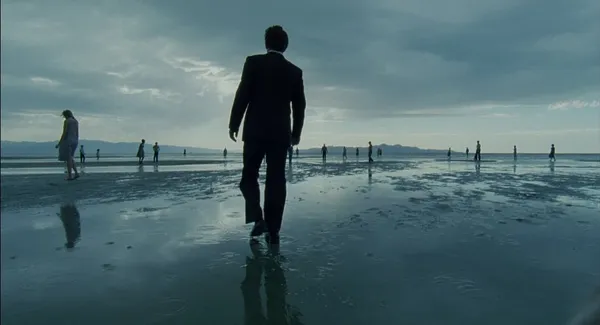Eye For Film >> Movies >> The Tree Of Life (2011) Film Review
The Tree Of Life
Reviewed by: Chris

A big budget movie with religious themes treads warily to recoup investment without alienating viewers. Tree Of Life (at $32 million) is no exception. Even with Brad Pitt and Sean Penn. It succeeds not by pleasing a mass audience but by being sufficiently wonderful to behold that enough people will come to stare. Each scene is almost a master-class in sound and vision.
Malick is true to himself, and draws a central line with philosophical sleight-of-hand. On one hand Tree of Life is a semi-biopic of a 1950’s, God-fearing, small-town family in America. On the other, momentous special effects look at the ‘God question’ in cosmological terms. God as the formlessness from which all things spring (including the Big Bang), versus an anthropomorphised Old Testament God that lives in the sky. Christians may well enjoy the large-scale attention given to their beliefs in general terms. Tolerant atheists (as opposed to Dawkinesque evangelical ones) may appreciate the spectacle and honest commentary, just as one may marvel at Gothic architecture or gargoyles without condoning the questionable practices and beliefs of the mediaeval Church.

Malick’s stated approach posits a fundamental choice between grace and nature. (This is a red herring: the film is conceptually broader than these two ‘options’ from the voiceover.) Standard religious questions (and answers) fall from the mouths of the characters. The 2001: A Space Odyssey–style visuals might suggest God (if he/she/it exists) is light, from whence cometh all things: evolution, the world, disparate beliefs, and so on. By adroitly avoiding the biblical Jesus, Malick gets reasonably close to harmonising scientific and religious camps, as well as the more atheistic creed of early Buddhism (to which Pitt seems to give more than the occasional career nod).
But on to our story. A Christian reading needs no interpretation. The struggling family (by middle-class America standards) is raising their three young boys. They ‘do their best,’ go to church, deal with bereavement, and look at their own shortcomings as parents. The story of Job is recalled as inspiration.
Brad Pitt plays Mr O'Brien, a strict, controlling father. Although there is only one instance where O’Brien verges on violence, the (well-intentioned) power he emanates is still intimidating. Mrs O’Brien (Jessica Chastain) is housewife-mother, exuding a simplistic love-and-peace. She leaves hubby to deal with the harsh realities of the world - and lets children (and hubby) walk all over her. (Critics of Judeao-Christianity might observe that the father epitomises faults of the Old Testament Jehovah, and the mother many of the faults of New Testament Jesus).
Our oldest son, understandably, makes hard work of his Oedipal journey. He reacts against Dad’s unbending discipline. He fails to respect Mum’s lack of backbone. Mrs O’Brien, with the luxury and frustrations of a Fifties kept woman, opines that love is nevertheless smiling through all things. “The only way to be happy is to love. Unless you love, your life will flash by.” Of course, she doesn’t find true love or such meaningful and lasting reflection of it in hubby. True to New Testament thinking, her love is one of self-sacrifice (though the angels do offer her some comfort).
Mrs O’Brien’s “giving” of her son to God, as a way of mentally coping with bereavement, struck me as unrealistic. Compare, for instance, Nicole Kidman’s character, faced with a not dissimilar loss, in Rabbit Hole... (soothing voice): “God had to take her – he needed another angel .” (Seething Kidman in reply): “Why didn’t he just make another angel?” Similarly Tree Of Life feebly tells us that the suffering of bereavement will “one day go away.” Whereas Rabbit Hole (with a script far more worthy of shouting about) says more realistically, “At some point it becomes bearable. It turns into something you can crawl out from under, and carry around like a brick in your pocket.”
With or without love, at 139 minutes, Tree of Life doesn’t flash by, and a lot of people in the screening I went to walked out. Although I felt entranced for almost its entirety, I admit nothing much ‘happened.’ This is a warning to cinema-goers demanding ‘a good story.’ There isn’t one. You could write it on the back of a communion wafer. But more precisely, there is no plot development. Mrs O’Brien recalls the Julianne Moore character from The Hours, but whereas Moore made a break for self-enlightenment and freedom, O’Brien doesn’t.
The Tree Of Life is not so much a story as a painting, a meditation, a beautiful canvas. The result is truly magnificent. Its staggeringly gorgeous visual collage of ideas is used almost to convince us that the Heidegger-like approach to the phenomenology of religion isn’t full of holes. Serious viewers might recall that this elision of God and Nature was done with far less profligacy in Tarr’s recent Turin Horse (which also managed to discard it with Nietzschean frugality). It’s almost like an enthusiastic preacher saying, “If I play the beautiful Mozart Requiem captivatingly enough, will you please believe in my God?”
The Tree Of Life offers little in the way of answers to the deep questions it pretentiously tries to raise: yet that should not stop you meditating on them – or even just enjoying the wonderful spectacle.
Reviewed on: 05 Aug 2011



















